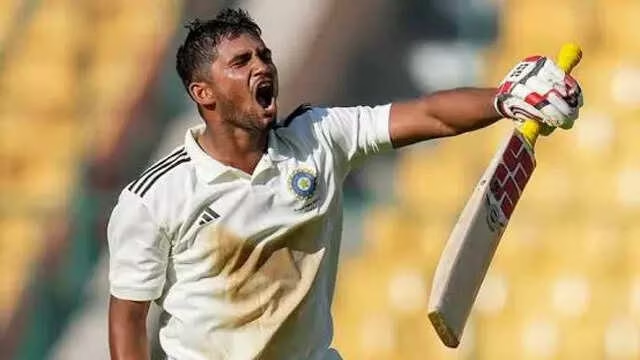Table of Contents
- A Century Forged in Grief
- Musheer Khan: The Man and the Batter
- The Innings That Said Everything
- Overcoming Injury and Loss
- What This Means for Mumbai’s Ranji Campaign
- A Family Tradition of Cricket
- Conclusion
- Sources
Cricket is often called a game of glorious uncertainties—but sometimes, it becomes a canvas for raw human emotion. In a match that will be remembered far beyond scorecards, Musheer Khan walked onto the Wankhede Stadium pitch carrying unimaginable weight: just hours earlier, he had lost his maternal uncle. Yet, with tears in his eyes and resolve in his heart, the 18-year-old Mumbai batter turned grief into grit, scoring a magnificent 112 against Himachal Pradesh in the Ranji Trophy. This wasn’t just another century—it was a tribute, a comeback, and a statement all at once.
A Century Forged in Grief
News of his uncle’s passing reached Musheer early on match day. Many expected him to withdraw. Instead, he chose to play—dedicating his innings to his late uncle, who had been a constant pillar of support throughout his cricketing journey.
Every cover drive, every pull shot, carried silent emotion. When he reached his hundred, Musheer pointed to the skies, his eyes welling up. The crowd at the Wankhede rose in a standing ovation—not just for the runs, but for the courage behind them. “This one’s for him,” Musheer later told teammates, according to sources close to the Mumbai camp .
Musheer Khan: The Man and the Batter
Musheer Khan is no stranger to pressure. Hailing from a cricketing family—his elder brother Sarfaraz Khan plays for India, and his father Naushad Khan was a first-class cricketer—expectations have followed him since childhood. But Musheer has carved his own path with elegant strokeplay, sharp technique, and a calm demeanor beyond his years.
He burst onto the domestic scene in the 2023–24 Ranji season, scoring three centuries and finishing as one of Mumbai’s top run-scorers. His left-handed grace, combined with sound defensive technique, has drawn comparisons to young Rahul Dravid—a compliment he wears with humility.
The Innings That Said Everything
Musheer’s 112 came off 184 balls and included 14 exquisite boundaries. What stood out wasn’t just the aesthetics—it was the context:
- He batted at No. 4, stepping up in the absence of senior players.
- Mumbai was under pressure at 42/2 when he walked in.
- He built a 168-run partnership with Suved Parkar, stabilizing the innings.
- He rotated strike intelligently against Himachal’s quality spinners.
His cover drives were crisp, his footwork precise, and his concentration unshakable—remarkable for someone who had just received heartbreaking news.
Overcoming Injury and Loss
This century is even more significant because it marks Musheer’s return from a serious hamstring injury that kept him out for over three months. Rehabilitation was grueling, and doubts crept in about his match readiness.
Then came the personal blow of his uncle’s death. To not only play but dominate under such circumstances speaks volumes about his mental fortitude. As former India selector Kiran More noted, “Great cricketers are made in moments like these—not just by talent, but by character.”
What This Means for Mumbai’s Ranji Campaign
Mumbai, the most successful team in Ranji Trophy history, is rebuilding with young talent. Musheer’s form is a massive boost. His ability to bat time and accelerate when needed makes him the ideal No. 4 in red-ball cricket.
With this century, he’s now scored four first-class hundreds before turning 19—a feat achieved by only a handful of Indian batters, including Sachin Tendulkar and Virat Kohli. Scouts from the BCCI’s junior national panel are already tracking his progress closely .
A Family Tradition of Cricket
The Khan family’s cricketing legacy runs deep. While elder brother Sarfaraz’s journey to the Indian Test team was marked by perseverance and public scrutiny, Musheer has quietly built his own reputation on discipline and consistency.
His uncle, who passed away, was reportedly his first coach and biggest cheerleader. “He used to take me to Azad Maidan at 5 a.m. for net practice,” Musheer once recalled in an interview. “He believed in me when no one else did.”
In that context, this century isn’t just runs—it’s gratitude, memory, and love transformed into performance.
Conclusion
Musheer Khan’s emotional Ranji Trophy century is more than a cricketing milestone—it’s a human triumph. By scoring 112 hours after losing his uncle and returning from injury, he has shown the world what true resilience looks like. As Mumbai pushes for another title, they now have not just a talented batter, but a young man whose heart is as strong as his bat. Cricket, in its most beautiful form, was on full display at the Wankhede—and Musheer Khan was its poignant poet.
